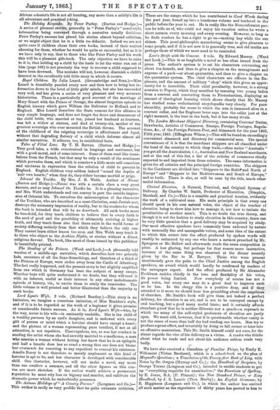Clerical Elocution. A Natural, Practical, and Original System of Delivery.
By Charles W. Smith, Professor of Elocution. (Simpkin, Marshall, and Co.)—This is a sensible and practical treatise, evidently the work of a cultivated man. His main principle is that every one should speak in his own natural voice, the object of the teacher of elocution being to show him how to manage it, not how to imitate the peculiarities of another man's. This is no doubt the true theory, and though it is not the fashion to study elocution in this country, there can be very little question that a good delivery may be acquired by study. Our most effective speakers have commonly been endowed by nature with unusually fine and manageable voices, and some idea of the extent to which this enters into the effect produced by spoken words will readily be estimated by any one who hears a sermon preached by Mr. Spurgeon or Mr. Bellew and afterwards reads the same composition in print. A less glaring, but perhaps for that reason more instructive, instance of the same thing was observed at the dinner recently given by the Bar to M. Berryer. Thoile who were present unanimously gave the palm to the Chief Justice among the English speakers, an award which would hardly be confirmed by readers of the newspaper report. And the effect produced by Sir Alexander Cockburn resides chiefly in the tone and flexibility of his voice, its power being limited. Now everybody of coarse has not a good voice, but every one may do a great deal to improve such as he has. In the clergy this is a positive duty, and if they attended to it more we should hear less grumbling about the emptiness of churches. Mr. Smith's book will give them not indeed a perfect delivery, for elocution is an art, and is not to be conveyed except by oral teaching, but a good many useful hints ; and it certainly affords abundant proof that he is neither illiterate nor a quack—a reproach to which too many of the self-styled professors of elocution are justly open. We must add, however, that it is questionable whether vanity is not the cause of more than half the bad reading one hears. Men try to produce a great effect, and invariably by doing so fall sooner or later into an offensive mannerism. This Mr. Smith himself could not cure, for the sinner regards the vice of his delivery as a virtue. A reader who thinks about what he reads and not about his audience seldom reads very badly. 4°




































 Previous page
Previous page